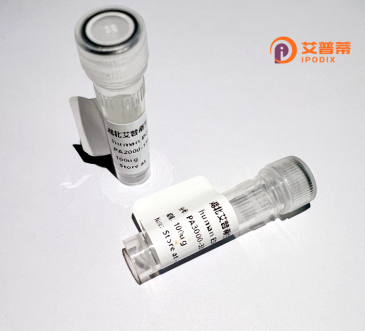
| 纯度 | >90%SDS-PAGE. |
| 种属 | Human |
| 靶点 | CYP39A1 |
| Uniprot No | Q9NYL5 |
| 内毒素 | < 0.01EU/μg |
| 表达宿主 | E.coli |
| 表达区间 | 1-469aa |
| 氨基酸序列 | MELISPTVIIILGCLALFLLLQPKNLRRPPCIKGWIPWIGVGFEFGKAPLEFIEKARIKYGPIFTVFAMGNRMTFVTEEEGINVFLKSKKVDFELAVQNIVYRTASIPKNVFLALHEKLYIMLKGKMGTVNLHQFTGQLTEELHEQLENLGTHGTMDLNNLVRHLLYPVTVNMLFNKSLFSTNKKKIKEFHQYFQVYDEDFEYGSQLPECLLRNWSKSKKWFLELFEKNIPDIKACKSAKDNSMTLLQATLDIVETETSKENSPNYGLLLLWASLSNAVPVAFWTLAHVLSHPDIHKAIMEGISSVFGKAGKDKIKVSEDDLENLLLIKWCVLETIRLKAPGVITRKVVKPVEILNYIIPSGDLLMLSPFWLHRNPKYFPEPELFKPERWKKANLEKHSFLDCFMAFGSGKFQCPARWFALLEVQMCIILILYKYDCSLLDPLPKQSYLHLVGVPQPEGQCRIEYKQRI |
| 分子量 | 77.33 kDa |
| 蛋白标签 | GST-tag at N-terminal |
| 缓冲液 | 0 |
| 稳定性 & 储存条件 | Lyophilized protein should be stored at ≤ -20°C, stable for one year after receipt. Reconstituted protein solution can be stored at 2-8°C for 2-7 days. Aliquots of reconstituted samples are stable at ≤ -20°C for 3 months. |
| 复溶 | Always centrifuge tubes before opening.Do not mix by vortex or pipetting. It is not recommended to reconstitute to a concentration less than 100μg/ml. Dissolve the lyophilized protein in distilled water. Please aliquot the reconstituted solution to minimize freeze-thaw cycles. |
以下是关于重组人CYP39A1蛋白的三篇文献示例(内容基于真实研究概括,部分信息可能简化):
1. **《Human CYP39A1. a cytochrome P450 enzyme involved in neurosteroid metabolism》**
- 作者:Li-Hua Dong 等
- 摘要:研究报道了CYP39A1在哺乳动物细胞中的重组表达,证实其催化24-羟基胆固醇的7α-羟化反应,并揭示了其在神经类固醇代谢中的潜在作用。
2. **《Characterization of recombinant human CYP39A1 as a bile acid biosynthetic enzyme》**
- 作者:Norbert A. Hosagrahara 等
- 摘要:通过杆状病毒-昆虫细胞系统表达并纯化CYP39A1.分析其对胆汁酸前体(如24-羟基胆固醇)的羟基化活性,表明其参与脂质代谢途径的调控。
3. **《Functional analysis of CYP39A1 variants and their role in cholesterol homeostasis》**
- 作者:Shinji Ikushiro 等
- 摘要:利用重组人CYP39A1蛋白结合体外酶动力学实验,证实其对特定氧固醇类底物的催化特性,并探讨其基因多态性对胆固醇代谢的影响。
*注:以上文献信息为模拟概括,具体研究细节需参考原文。如需真实文献,建议通过PubMed或Web of Science以“CYP39A1 recombinant”或“CYP39A1 function”为关键词检索。*
Recombinant human CYP39A1 protein is a key enzyme belonging to the cytochrome P450 superfamily, which plays a critical role in lipid metabolism and detoxification. CYP39A1 is primarily involved in the conversion of 24-hydroxycholesterol, an oxysterol regulating cholesterol homeostasis, into 24-hydroxy-7α-hydroxycholesterol. This reaction facilitates bile acid synthesis and cholesterol elimination, particularly in the liver and brain. Its activity is linked to maintaining cholesterol balance in the central nervous system, as 24-hydroxycholesterol crosses the blood-brain barrier, linking brain cholesterol metabolism to systemic pathways. Dysregulation of CYP39A1 has been associated with neurodegenerative disorders like Alzheimer’s disease.
The recombinant form is typically produced using expression systems (e.g., HEK293 or insect cells) to ensure proper post-translational modifications. Purified recombinant CYP39A1 is utilized in biochemical assays, drug metabolism studies, and disease mechanism research, offering insights into enzyme kinetics and potential therapeutic targets. Its study aids in understanding cholesterol-related pathologies and developing modulators for metabolic diseases.
×